Lighting up with an outfit
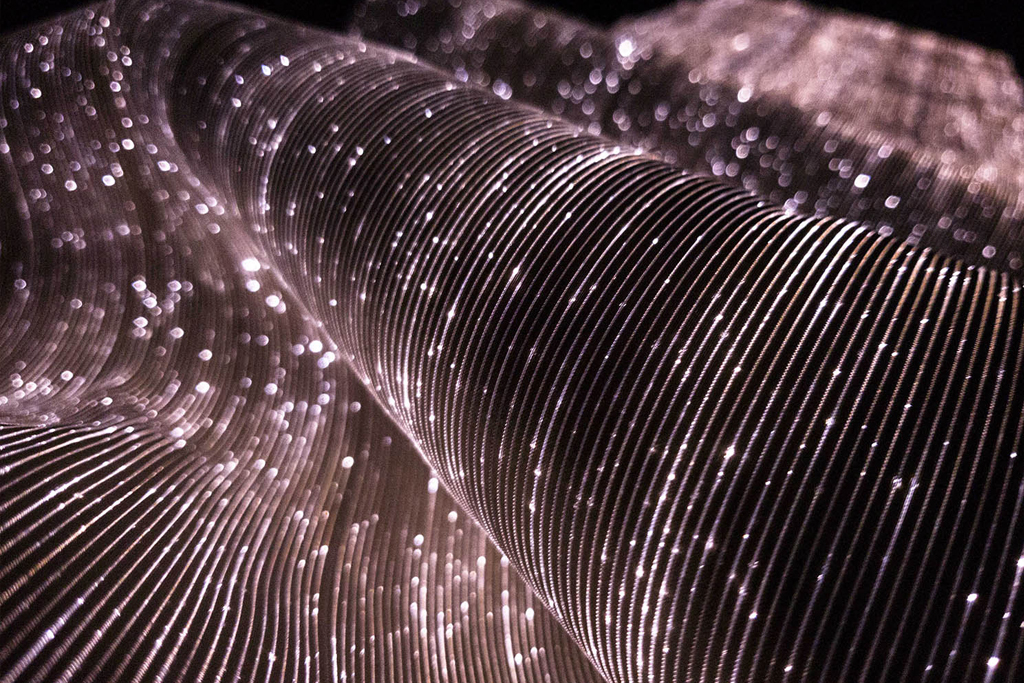
The desire of every woman, who re-emerges vividly at the approach of an important event, is always the same: to appear radiant, to emanate an aura of charm and beauty that captures the looks of people, when she is entering a room. Maybe it will be the effect of our culture, built in years of exposure to the products of the “dream factory”? Or to the images taken from fashion catwalks and fashion magazines? But is not the essence of fashion itself, to give a dress the ability to change our mind’s state, to open a smug smile on our lips and even change the color of our complexion or our eyes? Raise your hand if you did not let yourself be carried away by your imagination (at least once) wearing a special dress or dragged your sisters and friends in an endless hunt for the perfect outfit in the grip of the anxiety of being the protagonist of an evening (which you hoped could be magical).
.
Some clothes have power
to change our mood
If we think of our visual imagery linked to the concept of “lighting with an outfit” our mind can only recall the iconic images of Audrey Hepburn while she is having breakfast in front of Tiffany, of Marilyn while she sings in the company of her best sparkling friends, but also by Kate Winslet who meets Leonardo di Caprio wearing an amazing dark red dress studded with sequins, of which we can even hear the noise in the black night of the Titanic. However, if we reflect carefully, the strategies for lighting a garment and our complexion can be different: during the costume history we pass from the use of jewels or small shimmering elements sewn on clothes, to paillettes, metal clothes or iridescent fabrics … Without going too far in time, what about the fluttering colors of Emma Stone that follow one another in La La Land? The contrast with the diaphanous complexion of the protagonist makes her really radiant and at the same time brightens up the looks inspired by the Sixties.
Why am I telling you all this? To introduce the new interview I made in order to discover the wonders of high-tech fashion, thanks to which I will reveal a new way to capture the light on the dress you wear.
In Lombardy, precisely in Sant’Angelo Lodigiano, there is a weave that in 2009 started to make fiber optic fabrics. I discovered in the middle of one of my periodic trip on Internet, looking for innovative materials for the fashiontech sector. The images of the accessories and clothes that can be made with their fabrics and embroidery of light are really intriguing and so I immediately decided to contact them, in order to host an interview with the CEO of Dreamlux dr. Tommaso Galbersanini on the digital pages of Chic Words. [Note 1]
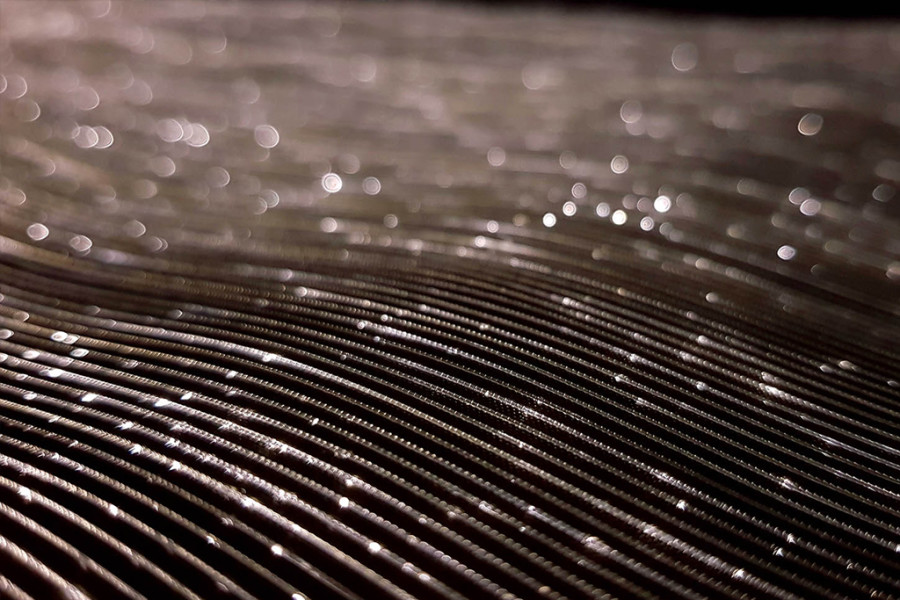
During my research I had already met companies that produce fabrics with optical fiber, but the images of their fabric samples, clothes and accessories were characterized by an unripe aesthetic study, i.e. an excessive use of light without a precise style consciousness. Several years have passed since Paco Rabanne’s manifesto clothes, which used fiber optic, as a symbol of research on unusual materials to challenge the rigid canons of couture. However, until the 2000s this material was still perceived by the public and the fashion world as a bizarre and foreign element.
Dreamlux fabrics have instead the merit of treating the light as a real thread both in the weaving phase, in which the “fiber of light” is inserted and blended with more traditional yarns, not only from a technical point of view but evaluating visually the final color and the look of textiles and clothes; both in the pattern making phase itself, harmonizing it in the overall construction of garments.
Maddalena Mometti: The history of his company began 60 years ago, as a company of weaving and embroidery of natural fibers. How was the transition from traditional technologies to optical fiber processing? What did this idea entail and how did it come about?
Tommaso Galbersanini: The task that we gave ourselves to “weave the light” is a research project that dates back to 2006 with the name of Luminex. It was subsequently transformed into Dreamlux in 2014, when we started to invest and create a collection and finished products. The interesting challenge was having to equip ourselves with some machinery useful for the processing of the optical fiber, or rather adapt the machines: setting them for the new characteristics of this yarn. Weaving the optical fiber is a complex and slow operation. The frame must be readjusted not to damage it. It should also be noted that the weaving operation represents only 20% of the path leading to the creation of the final fabric. Once the fabric has come out of the frame, it must be treated, wired, cut: a series of processes that go beyond the textile world, but which are instead part of the electronic world.
Maddalena Mometti: Finding staff with the skills required by projects that involve cross sectors, like yours, has been difficult?
Tommaso Galbersanini: I must say that it was very difficult. In our case, we decided to enhance the personnel we already had in the manufacturing department and train it with respect to the new operations to be performed. Within our team we have an electronic engineer, who manages the relationship with suppliers for the electronic part and software development.
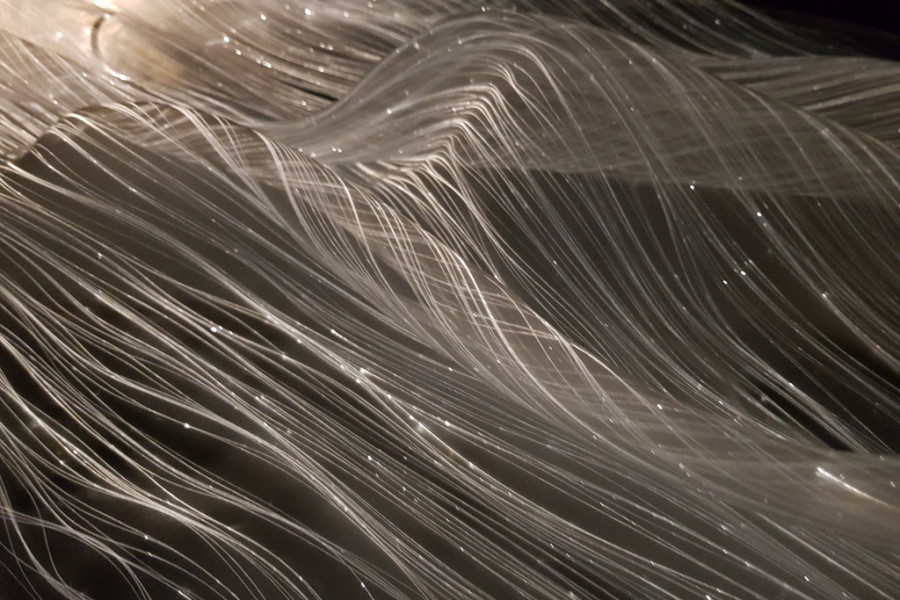
Maddalena Mometti:When did you start proposing your product, did you find any difference in the response from the Italian or foreign market?
Tommaso Galbersanini:Foreign customers are much more receptive: I refer to the Middle East market but also the Far East. Vietnam and China are among the countries most inclined to welcome the news in the fashiontech sector. Italy is the country that has the greatest resistance in terms of cultural acceptance. In the design world they are more open than the fashion industry. I found that the players in the fashion industry have difficulty digesting these novelties and imagining them in their products, such as a shoe or a bag. One of our strategies is to work alongside with external professionals who create a finished model for us, to be presented to fashion companies and show real applications.
Maddalena Mometti:And what about feedback from opinion leaders in the fashion world? Or exhibiting your products in fairs and events? Are there any differences between the Italian and foreign scene?
Tommaso Galbersanini: High-tech always makes a lot of noise. At fairs we are always present and they give us a lot of visibility. The difference I notice is in the acceptance of innovations between the real world and fashion events. In the real world the novelties that are seen for fashion are new designs and new aesthetic proposals, but made with known techniques. There have been innovations in printing techniques, thermoforming and thermosealing for pattern making, but I have not yet seen a truly innovative finished product. But the space to insert is there and data confirm this. Idtechex [Note 2]for example organizes events dedicated to wearable design and the interest is growing, especially for the creation of bracelets and smart watches. Most of the requests for our products come from the furniture / design sectors, and secondly from the automotive and entertainment ones. But the sectors are gradually multiplying. In the fashion industry we need some opinion leaders who launch the fashiontech.
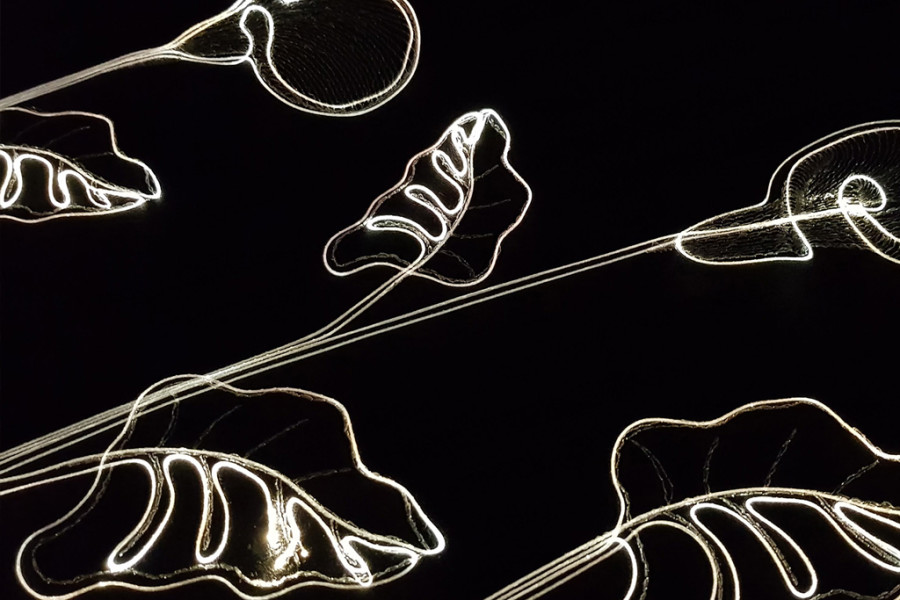
Maddalena Mometti: I read that you have already worked with several famous designers! Do you want to tell me something about these collaborations?
Tommaso Galbersanini: The project that has most attracted media attention all over the world is the dress created together with Zac Posen for the Met Gala of 2016 , which was reported in the New York Times and during the David Letterman Show. [Note 3]We have received great attention. After a month from the event the phones were still hot: many people wanted to buy the dress worn by Claire Danes, even private individuals to use it as a formal dress. And moving on to creating an evening dress or a garment for a special occasion is a short step. We have also realized projects with many other designers from Armani to Versace.
Maddalena Mometti: Let’s talk about wearability.
Tommaso Galbersanini: Our clothes on average require the use of 1 or 1 batteries that together do not weigh too much. The fabric is then very soft: 120 gr/m. The clothes that use our fabrics are really wearable. Of course, a dress like that of Zac Posen is not used for every day, but for a ceremony or a wedding it is absolutely comfortable.
Maddalena Mometti: Do your clothes require special care when washing or maintaining?
Tommaso Galbersanini: As with all the fine silk fabrics, you must keep the dress on the clother hanger and wash it by hand or dry washing. The batteries are instead rechargeable with a micro USB connection and in two hours are ready.
Maddalena Mometti: I saw that you have a very rich color selection in your catalogue. Which elements causes the final color of the fabric?
Tommaso Galbersanini: We have a wide range of fabrics not only colors. We can offer our customers over 20 luminous fabrics, different in structure and weight. Each fabric has its own color range that is given by the yarn: black, grey, red or blue (weft and warp), then we match the light (given by the color of the LED). The final color is due to the interaction between the fabric and the light.
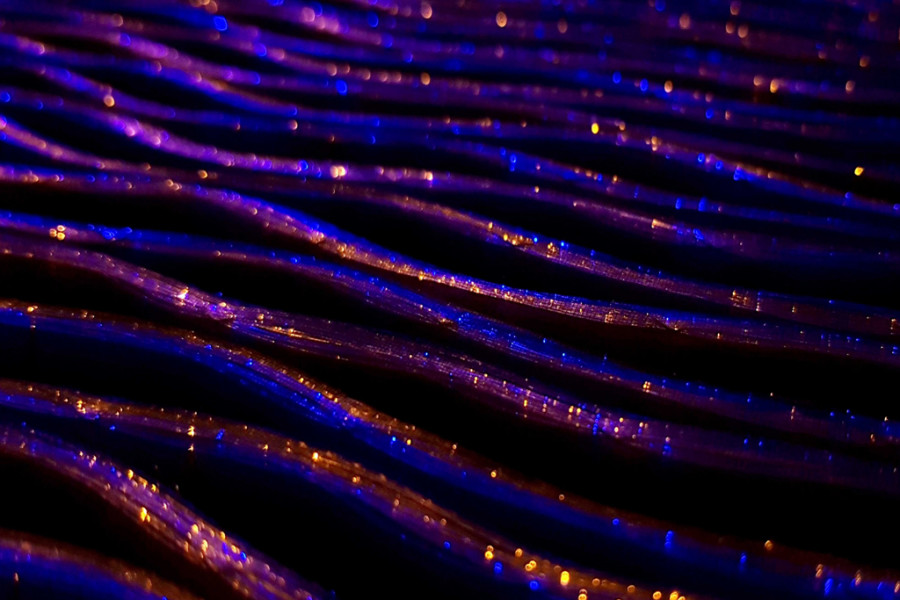
Maddalena Mometti: Is it possible to create patterns that change over time on the surface of the fabrics?
Tommaso Galbersanini: Yes sure. We are able to create luminous patterns in certain areas of the garment that are activated with different timings, thanks to the use of a microprocessor that manages the LEDs. We can also create very special effects by exploiting the diversification of the prints and the choice on how and where to place the optical fiber.
Maddalena Mometti: How does the collaboration with a stylist start?
Tommaso Galbersanini: Everything starts from the intuition of a stylist, who contacts us. This is followed by a phase in which we perform a feasibility check and carry out a study model, which is developed together. Finally, the designer sends us the paper pattern and proceeds with production.
Maddalena Mometti:How much time does it take from the concept phase to putting it into production?
Tommaso Galbersanini: From 30 to 60 days.
Maddalena Mometti: In your opinion what is the next challenge for the high-tech fashion sector?
Tommaso Galbersanini: We often talk about connectivity but the turning point will be finding the right features to make sense of the connected accessories in real life. Furthermore, many potentials are opened up in research on materials and software.
FOOTNOTES
[1] Interview with dr. Tommaso Galbersanini, CEO of the Dreamlux company, by Maddalena Mometti,6th July 2018
[2] Idtechex is a research and consulting company that carries out market research, business intelligence and events on emerging technologies. Official website of Idtechex: http://idtechex.com.
[3] The Met Gala is the most important social events in the United States, after Oscar Night. It is also known as the Met Ball or Costume Institute Gala ant it is a celebratory party of fashion and a vernissage of the annual exhibition dedicated to the fashion industry from the Metropolitan Museum of Art in New York, nicknamed “The Met”. The party also serves to raise funds for the museum itself.
IMAGES
The images are published by kind permission of Dreamlux and they are all fabrics and embroideries produced by the company itself. Starting from above:
[image 1] Detail of Velo fabric
[image 2] Detail of Velo fabric
[image 3] Detail of Organza fabric
[image 4] Fiber-optic embroidery, made by Dreamlux company
[image 5] Detail of Fluid fabric

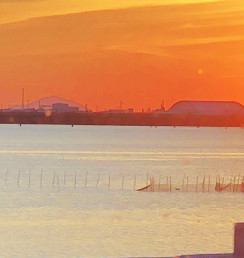
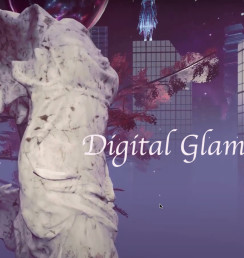
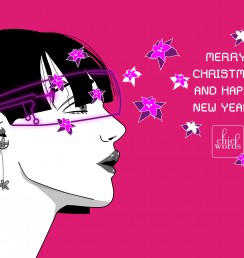

I’ve been browsing online greater than 3 hours lately, yet I by no means discovered any
attention-grabbing article like yours. It is beautiful worth enough for me.
In my view, if all site owners and bloggers made just right content material as you did, the web might be much more helpful than ever
before.